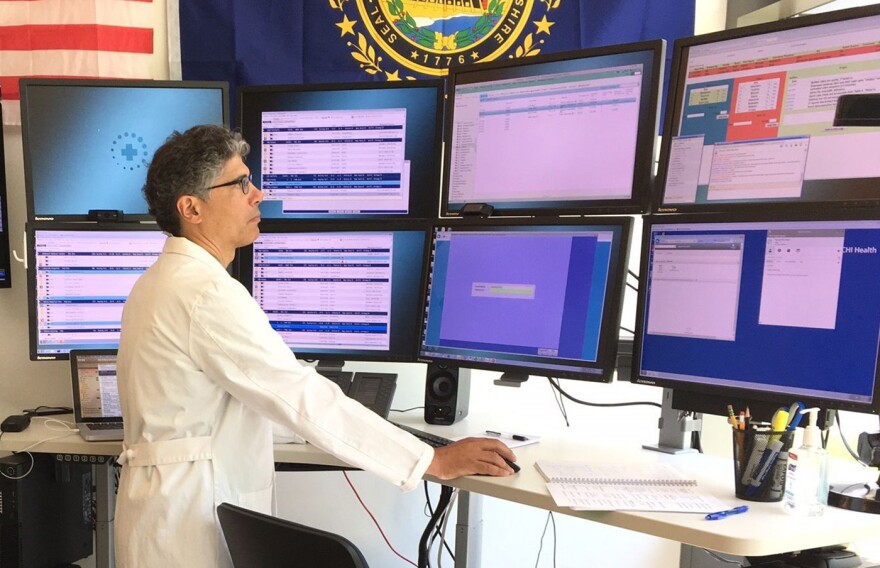Vermonters who took part in the new VPR-Vermont PBS Rural Life Survey said that traveling distance was one reason why they had trouble getting the health care they needed. Some health experts say telehealth services could be one way to better serve people in rural areas that need health care.
Telehealth services have been expanding and improving nationwide. They range from low-tech and relatively inexpensive services like tele-pharmacies, where a pharmacist who is offsite can prescribe medicine, to the more expensive tele-intensive care units and tele-neurology, where a specialist in one hospital can aid a stroke patient at a second location.
"I think telehealth is a really important component for rural hospitals," said Devon Green, vice president of government relations with the Vermont Association of Hospitals and Health Systems.
More from NPR — "With Rural Health Care Stretched Thin, More Patients Turn To Telehealth" [July 7]
The recent Vermont Rural Life Survey found that 11% of respondents said they did not get health care when they needed it within the past few years. That particular group was then asked follow-up questions as to why they had trouble getting that health care; the travel involved was a reason for about a third of those respondents.
Green said anytime telehealth can bring a specialist or a service into a hospital, it means a patient doesn't have to go outside of the area to get the care they need.
"It takes a toll on people to have to drive a long distance," Green said, "whether it's because of work or weather or, you know, you have small children. It's really nice to be able to stay in your own community and get your treatment there and have all those resources around you."
"It takes a toll on people to have to drive a long distance. ... It's really nice to be able to stay in your own community and get your treatment there and have all those resources around you." — Devon Green, Vermont Association of Hospitals and Health Systems
Six of Vermont's 14 hospitals lost money last year, and when a patient has to move because a medical service is not available near home, that hospital loses the income that comes from treating the patient.
"It's very helpful for a local hospital to have a way to keep patients in their existing ICU beds, if they have ICU beds," said Dr. Steve Surgenor, medical director at the Dartmouth-Hitchcock Medical Center TeleICU. "It's good for that hospital, but it's also so good for those patients. They don't need to travel far distances to get care that they can get safely in their own community. It can be a turnaround scenario for some of these hospitals."
The Dartmouth-Hitchcock TeleICU is a new service where a doctor monitors a patient 24 hours a day from the hospital in Lebanon, New Hampshire. Southwestern Vermont Medical Center, in Bennington, is the first hospital in Vermont that is using the service.
The TeleICU is about as high-tech as telehealth gets right now in Vermont, but the way hospitals in the state are embracing telehealth runs a wide range.
The hospitals within the University of Vermont Health Network — which include Porter Medical Center, in Middlebury, and Central Vermont Medical Center, in Barre — are expanding their services, while smaller hospitals like Northeastern Vermont Regional Hospital, in St. Johnsbury, and Grace Cottage Hospital, in Townshend, offer very few telehealth services.

"The promise is great in that it would give us access to specialists who actually have eyes on and listen to patients — so virtually examine them from afar — and we really do need those services," said Dr. George Terwilliger, chief medical officer at Grace Cottage Hospital. "But my understanding is that we're not able to afford that."
Grace Cottage ran a pilot study last year to see how their patients reacted to telehealth in the home. But according to Andrea Seaton, director of community relations at Grace Cottage, the pilot study didn't go too well.
"The problem in a rural area is connectivity," Seaton said. "We really had tremendous connectivity issues. And what we learned is that in rural areas connectivity needs to be greatly improved before telehealth in the home can take place."
More from NHPR — "Growth of Telemedicine in N.H. Has Hopes High, But Questions Remain" [July 16]
During the last legislative session, state lawmakers set up the Rural Health Services Task Force to figure out why some Vermont hospitals are losing money.
The task force is expected to put together a series of recommendations which will likely include how telehealth can help some hospitals. Their report is due early next year.

This fall, VPR and Vermont PBS are collaborating to present This Land: The Changing Story of Rural Vermont to explore the challenges and opportunities of living in rural Vermont — from health care and education to the economy, housing, workforce training and so much more.
This project was made possible by our supporters, and by AARP Vermont and the Vermont Community Foundation.






